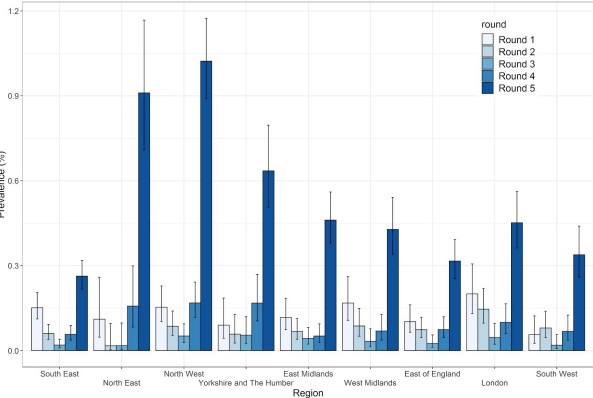60 in 100,000 now infected with Covid across England
In Analysis
Follow this topic
Bookmark
Record learning outcomes

Around 450,000 people in England now are likely to be infected with SARS-Cov-2 on any one day. Between September 18 and October 5 the number of people with coronavirus infection increased substantially across the generations and country, with 60 in 10,000 infected (0.60 per cent), according the latest findings from round 5 of the REACT study.
The latest report warns that as the number of infections continues to rise, it is likely the current levels of infection identified in the north of England will replicate across the rest of the country in a few weeks’ time.
Out of 174,949 swab results taken over the 18 days in the most recently completed round of testing, 824 were positive. This is significantly higher than the prevalence of 0.13 per cent measured during late August and early September, and the highest observed prevalence of any round since the study started reporting in May.
Using only the data gathered between September 18 and October 5, the reproduction R is estimated to be 1.16 and the virus is calculated to be doubling every 29 days. The R rate is lower than that measured for the period 20 August to September 8, when the R rate was 1.7 and the doubling rate 7.7 days.
Across the age bands, prevalence was highest among 18-24 year-olds at 1.2 per cent, meaning one in 80 in this age group are infected. In addition, there has been an eight-fold increase in infections for those aged over 65 compared to the period August 20 to September 8.
The prevalence of infection increased in all regions between August 2020 and early October 2020. The highest unweighted prevalence of infection was in the North West at 1.02 per cent, followed by 0.91 per cent in the North East and 0.63 per cent in Yorkshire and The Humber.
Asian and black ethnicity was associated with higher prevalence of infection at 0.90 and 0.73 per cent respectively. People of black and asian ethnicity had up to two-fold higher rate of infection compared with white participants.
Those living in large households of with six and 7+ residents had also had higher prevalence at 0.81 and 1.06 per cent than those in single occupancy households where prevalence was 0.35 per cent.
The Real-time Assessment of Community Transmission (REACT) programme is the largest, piece of research looking at how the virus is spreading across the country. The study was commissioned by the Department of Health and Social Care and is carried out by Imperial College London, Imperial College Healthcare NHS Trust and Ipsos MORI.
